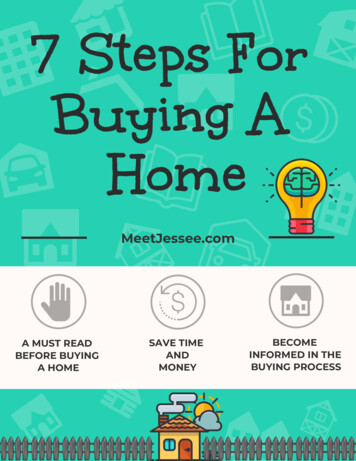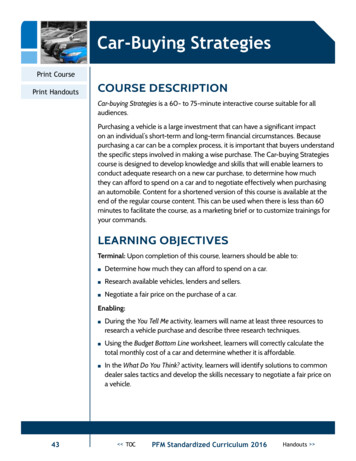
Transcription
7 Steps ForBuying AHomeMeetJessee.comA MUST READBEFORE BUYINGA HOMESAVE TIMEANDMONEYBECOMEINFORMED IN THEBUYING PROCESS
Are You Ready To Buy A Home?You may be considering buying a home but haveno clue where to start. I may not be able to turnyou into a home buying "expert" with a singleguide but it will give you a much betterunderstanding of the home buying process. Sothat should you decide to buy someday you feela lot more confident about the process.Regardless if you choose me as your realtor ornot I hope you take advantage of thisinformation and the process becomes enjoyable,fun and exciting for you!Unless you will be paying for a home with cash you will need tolook into some type of financing. There are many types ofMortgages but the most common financing for first time homebuyers is an FHA mortgage. The down payment for this loanprogram is 3.5% of the final purchase price. For example if yoursales price is 100,000 your down payment would be 3,500.(Not Including Closing Costs)After saving up for your down payment you shouldhave three to six months of reserves after closing onyour home. This would be additional funds to helpcover your liabilities for three to six months shouldsomething happen.Reach out if you would like help buying your dream home!
Tips for savingfor a downpaymentTransfer a fixed amount into a special savings account every month.Set up an automatic direct deposit into a savings account. Commit to never usethese savings for any purpose other than your down payment.Reduce high interest rate debt.High interest rates on credit cards can seriously limit your ability to save. Startwith paying off your highest interest rate card, when you've paid the entirebalance, close the card and proceed to pay off the next.Lower your expenses.Review your expenses and look for what you can reduce or eliminate. Put themoney you would have spent on those items into your down payment savings.Get a side hustle.Even temporarily, earnings from a second income can help make substantialcontributions to your down payment savings.One of the most personally influential financial quotes comes fromRobert Kiyosaki the author of Rich Dad Poor Dad."You Create Your Own Poverty"- Robert KiyosakiAfter you have saved up for a down payment and have your reservesin place you will need to find a realtor to help you with the homebuying process.A good realtor will do the following for you:Ensure compliant processes under state & localregulationsUse sales skills to negotiate the best priceResearch listings that match your criteriaKeep you updated with local market activityCompletes & submits paperwork such asagreements, invoices and other documentsSchedules & attends showings as well as othermeetings such as title signingReach out if you would like help buying your dream home!
Tips forfinding arealtorAttend Open Houses To Interview AgentsOpen houses are a great way to meet and interview several realtors withouthaving a formal office meeting. This also shows you that the agent is willing towork weekends!Look on FaceBook as well as other social media pagesFacebook groups as well as real estate pages are great places to find a realtor.Browse local real estate websitesYou can find agents on agent websites as well as brokerage sites.Ask friends, family and coworkers if they know of an agent.Your social sphere is a great place to find a recommended agent especially if theyhave bought and or sold a home with that agent.Office walk-ins and neighborhood signage.While going to the store or back and forth from work keep an eye out for road signs.This is usually a good sign that someone else has trusted them to get the job doneespecially if there is a "SOLD" sign posted. Office walk-ins are another great way.Here is a quote by writer Mark Twain that put an interestingperspective on real estate.Buy land, they're not making it anymore.- Mark TwainNow that we have our down payment, reserves and a goodrealtor working for us we need to get pre-approved for amortgage. If you are not sure where to start then ask yourrealtor. They should have a few recommendations formortgage lenders in your area that they have worked with inthe past. You will need to submit a loan application with thelender where they will evaluate credit scores, income to debtratios, employment history and other things related to yourability to be good for the loan amount.While this seems like a lot of work a good lender will makethe process seamless and get you house hunting in no time!Reach out if you would like help buying your dream home!
Tips for gettingapprovedStay at your jobSticking with your employer while going through the home buying process iscrucial. Any changes to your employment or income status can greatly delay themortgage process or disqualify you all together.Pay Down Debt and Avoid New DebtYou don’t need a zero balance on your credit cards to qualify for a mortgage loan.However, the less you owe your creditors, the better. Your debts determine if youcan get a mortgage, as well as how much you can acquire from a lender.You don't need perfect credit to qualifyMany mortgage programs will require a 620 or higher credit score in order toqualify for a loan. Although, FHA loans are available to people with credit scoresas low as 580. However, just because you have a 580 credit score doesn’t meanyou will automatically qualify. Lenders look at a lot more than just your creditscore.“Not now” doesn’t mean “never”Home ownership is just not a realistic option for everyone right now. If you fall intothis category, don’t despair. Your financial circumstances could change, theeconomy is still very much in flux, and remember a lot of home buyers getting inover their heads. When it comes to a major purchase like a home, timing is critical.“Beware of little expenses; asmall leak will sink a great ship.”- Benjami FranklinCongratulations, you have been pre-approved for a mortgage. Now youcan start looking for your dream home.Some things to consider when looking is proximity to family, schoolsand commute to work. Work with your realtor so that they understandyour must haves. Then they can help you identify homes that not onlyfit your must haves but your budget as well.After viewing a few homes yourcriteria may change. This is anormal part of the process. Makesure to stay in communication withyour realtor so your both on thesame page.Reach out if you would like help buying your dream home!
Tips whilehousehuntingIdentify your housing needsWhat kind of house do you prefer? Do you want a one-story home or two? Howmany rooms? How much square footage? A yard for a dog? These are questionsyou need to answer in advance, before you start house hunting. You need to knowthis information, and your realtor does as well.Understand your budget and what your budget gets youBe realistic about the pricing. It's going to limit the features you can affordwhen buying a home. If you want a three-bedroom home with at least 2,500square feet, but your budget is more in line with a two-bedroom home of2,000 square feet, you'll have to make some compromises.Compile a list of must havesThese are things you simply can't do without. If you're moving up from atwo-bedroom home because your family has outgrown it, then a threebedroom home is a must-have item. You can't compromise on this. Putthese items on a separate list from the other things you want, or highlightthem in some way for your real estate agent.Think about home value appreciationDon’t just go for a groovy porch or spacious yard.Look for a home that’ll grow in value over time.Research the history of home values and businessesin that area. Are home values rising? Is the number ofbusinesses increasing? Those are good signs!For most the perfect home does not existHere's a universal truth of home buying. You will neverfind a house that has every single thing you want. Butyou will find a place that has most of the things youwant, and possibly all of the things you need. So beflexible.“Don't wait to buy real estate, buy realestate and wait.”- Will RogersReach out if you would like help buying your dream home!
Be Fast!!The written offer is legally binding, so in most cases a simpleletter won’t work. There are many state, and sometimes local,laws guiding the process, so you’ll want to cover all the bases byusing a sales contract or what your realtor might refer to as apurchase and sale agreement.The Offer Process:1. Submit An Offer2. The seller accepts, counters or declines theoffer.3. If it’s accepted, you move on to the next step.4. If the seller makes a counteroffer, you eitheraccept it or make a new offer — and go back tostep 2.5. If the offer is refused, you can make a newoffer or begin a new round of house hunting.Well priced homes sell fast. Werecently had buyers in the market fortheir first home. A perfect home forthem went live at 6:00pm, and wewere viewing it by 6:30 pm. OtherRealtors and buyers showed up butwere too late. We had an offersubmitted by 7:30pm, and we lockedup the deal for our buyers becausethey were available and ready!Submit a Pre-approval Letter With Your OfferSubmitting an offer with your pre-approval letter tells the seller that you are serious andqualified—you are ready to purchase, and you have already committed to a lender. If theseller has a higher offer from a buyer without a pre-approval letter, your offer will likely win.Tips ForSubmitting AnOfferBe as quick as you can when submitting your offer—especially if the house hasn’tbeen on the market long.Know what you’re looking for in advance and assume you’re not the only person looking at the house—because youprobably aren’t. You want to beat other buyers to the punch!ADOM (Average Number of Days on the Market)If the home you are preparing to offer on has been on the market any more than a couple of weeks beyond the averageDOM in your area, the seller's motivation level is likely to be higher, and the market has begun to "educate" the sellerthat the list price might just be too high. Whether you are buying in a buyer's or seller's market, a much longer-thanaverage DOM is a signal that there may be an opportunity for you to purchase the property at or below the list price.Reach out if you would like help buying your dream home!
The most dangerous negotiation isthe one you don't know you're in.- Christopher VossOnce you get to this step, you’ll officially be under contract on your new home! Itmay seem overwhelming but it's something to celebrate. Being under contract alsomeans you’re done with the most time-consuming stages of the home-buyingprocess.The point of the due diligence period is to work through the contingencies putforth in the purchase & sales agreement.Common Contingencies Written Into A Sales ContractHome InspectionsEngineers report forFire Place InspectionSeptic SystemTitle ReportFurnace InspectionWell Flow TestWell flow testOther contingencies may include but are not limited to appraisals, final loanapprovals, contractor bids, land soil tests and receipt & review of documents thatmay not have been provided at the time of submitting the offer.Tips for thedue diligenceperiodBe sure that all inspections be completed by a licensed professionalThe last thing that you want to have happen is the owner do their own repairs andthings fall apart shortly after moving in.Make sure inspectors note the inspected itemsFor example if your getting a furnace or hot water heater inspection make sure itsitemized by units that were inspected and don't accept generalizations such as"heating systems operational". A further layer of protection is to make sure thecompany doing the inspection notes the unit being inspected by its serial number.Everything is negotiable but be prepared to walk awayYou will never get what you don't ask for. One example would be if the inspectionreveals major problems with the home, you can ask the seller to fix the problem,reduce the price, or cancel the contract. Should the seller not be be willing to cometo agreeable terms than walking away from the deal may be your best option.Reach out if you would like help buying your dream home!
“It’s OK to have your eggs in one basket as long as youcontrol what happens to that basket.”- Elon MuskMost closings require the buyer to bring funds for closing. The funds have tobe in an acceptable form. That’s usually a cashier’s check made out to theescrow company or wire transfer.Be sure to find out what type of identification is required. Usually, only onetype of identification is needed, though some companies require two.Government-issued identification, such as driver’s licenses and passports,are normally accepted.Once everything is signed and your funds required toclose have been paid we wait for recording. Your realtorshould already have the keys to the property but you cannot move in until the property has recorded. This usuallyhappens within twenty four hours after your lender haswired funds.Communicate anyquestionsWhile in closing do not hesitate toask questions, especially if there issomething you are confused about.Do not assume because you aregetting a copy of everything thatyou will be able to figure it out later.Just ask!The harder theconflict, the greaterthe triumph.- George WashingtonYou have recorded and you can now move in!Congratulations, you are now the owner of your own home! Whether you share it with family,friends or pets I sincerely wish your able to fill your life with joy and memories to last a lifetime in your new home!I genuinely appreciate that you took the time to read this general guide even if I am not orwas not your realtor of choice. I hope that in return you feel more informed and confidentgoing forward with the home buying process!If I was lucky enough to be your realtor our goal is for you to have so much confident in usas your realtors that should you decide to sell after several years of living in your home thatwe are the first ones that come to mind!Sincerely, Thank you!- Jessee"You can never have too manypictures but you can have toofew. Create memories!"- JesseeReach out if you would like help buying your dream home!
Robert Kiyosaki the author of Rich Dad Poor Dad. "You Create Your Own Poverty" - Robert Kiyosaki. Reach out if you would like help buying your dream home! Tips for finding a realtor Open houses are a great way to meet and interview several realtors without having a formal office meeting. This also shows you that the agent is willing to











